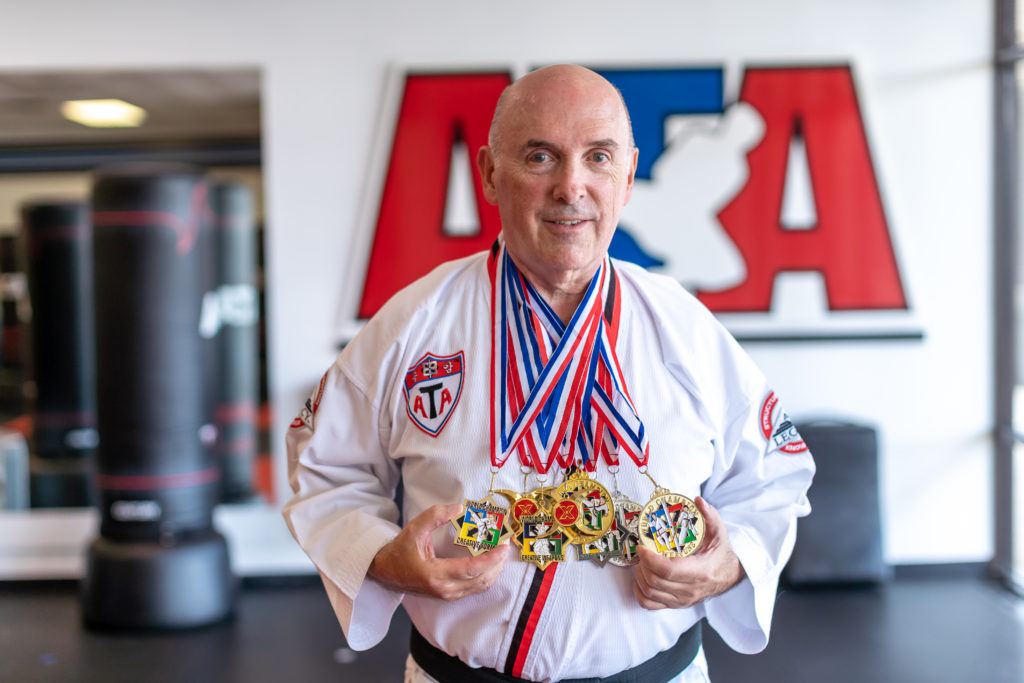Tenacious McGee
At an age when most are reflecting on lifelong careers and enjoying their golden years, Robert McGee, 74, has no plans to slow down.

By Jordan Burress
How has Robert McGee (JD ’80) been able to amass 23 academic degrees, publish 59 nonfiction books and five novels and win over 60 gold medals in U.S. national taekwondo and karate championship tournaments?
“I just didn’t sleep for 25 years,” he says with a smile.
It sounds like a joke, but it wouldn’t be implausible if there was a hint of truth in the statement.
“I always like to keep busy, although that’s changed a little bit the past few years. And now I take 30 minutes off every Saturday afternoon.”
He says that with a straight face, but then a sly smile emerges, so there’s no telling. But for a man who’s accomplished as much as he has, it doesn’t seem all that unlikely either.
 McGee credits his Catholic school upbringing in Erie, Pennsylvania, for his relentless drive.
McGee credits his Catholic school upbringing in Erie, Pennsylvania, for his relentless drive.
An idle mind is the devil’s workshop, the nuns would tell him, and he took it to heart and made sure he stayed busy.
“It’s a guilt thing,” he jokes.
McGee launched his pursuit of academic degrees to land in the Guinness Book of World Records. At the time, the record holder claimed only nine degrees, so he commenced to best that, earning degrees from universities in five countries, including England, Hungary, Estonia and Latvia.
His juris doctorate from CSU Cleveland-Marshall College of Law was the first of his 13 doctorates.
And while it might seem that his efforts were merely to earn some sort of superfluous recognition, they weren’t. McGee’s an inquisitive person with what seems an insatiable appetite for learning.
Take for instance the time he taught himself international accounting standards on a plane ride en route to instruct the Armenian finance ministry how to convert the country to international accounting standards.
“By the time I arrived, I knew more about it than anyone in the finance ministry.”
McGee subscribes to the Richard Branson-esque school of thought that you never turn down experiences for fear of being unqualified. He has several stories to tell about jobs for which he was largely unprepared, jobs that he secretly learned how to do once he got them.
This — and that incredible drive of his — just might be a reason that nearly ten years ago, at the tender age of 65, he started studying taekwondo.
Initially wary if his sexagenarian limbs could handle the sport, he gave it 30 days.
“I didn’t have a heart attack, I lost weight, my cardio [fitness] got better, so I decided to keep doing it.”
A few months later, his trainers encouraged him to enter a local tournament. And while he wasn’t the best, he kept at it.
 At a regional tournament in Raleigh, North Carolina, he won a couple gold medals. He traveled to Charleston. Then Atlanta. And starting winning.
At a regional tournament in Raleigh, North Carolina, he won a couple gold medals. He traveled to Charleston. Then Atlanta. And starting winning.
“I figured this must be some kind of mistake.”
But it wasn’t and with his local and regional experience, he entered a national tournament, winning a couple bronze and silver medals. By then, he was hooked and set his sights on winning a national championship.
He trained harder and started winning golds at the national level.
“Then I decided, well, maybe I should try the world championships. I’ve got nothing to lose, right?”
Why not, Robert?
It took some time, but after his 70th birthday, he started winning gold. Today, he’s 74.
And then he branched out to karate, kung fu and tai chi. His results were lackluster like before, but eventually his persistence earned him even more medals.
During the early months of the pandemic, when all tournaments were cancelled, he’d stand in his driveway and participate in virtual tournaments and win those as well.
In all, he’s won over 800 gold medals and is a member of the United States Martial Arts Team.
But even with all of his accomplishment, McGee still isn’t ready for a break except for those 30 minutes every Saturday. He also has no plans to retire as a professor of accounting at Fayetteville State University or scale back on his martial arts training either.
He even laments that he fell short of his initial degree goal. He’d originally planned for 20 doctorates.
But 13 will have to do.
“I guess,” he says.
Also in this Issue...
The Space for Success
Throughout the past few years, CSU has developed a collection of student success programs that set students on an upward trajectory. This summer saw the rollout of a new, highly popular initiative that had both students and parents breathing a sigh of relief.
With access for all: space law and the final frontier
Imagine even non-billionaires can travel to the edge of space (and beyond). See yourself vacationing on the moon. Picture your company mining asteroids, or ushering in a new era of space recycling by repurposing the junk that previously orbited Earth.
What now?
Just over a year ago, the nation was embroiled in what many called a long overdue reckoning over racism, equity, diversity and more. But now, that fervor appears to have subsided.



